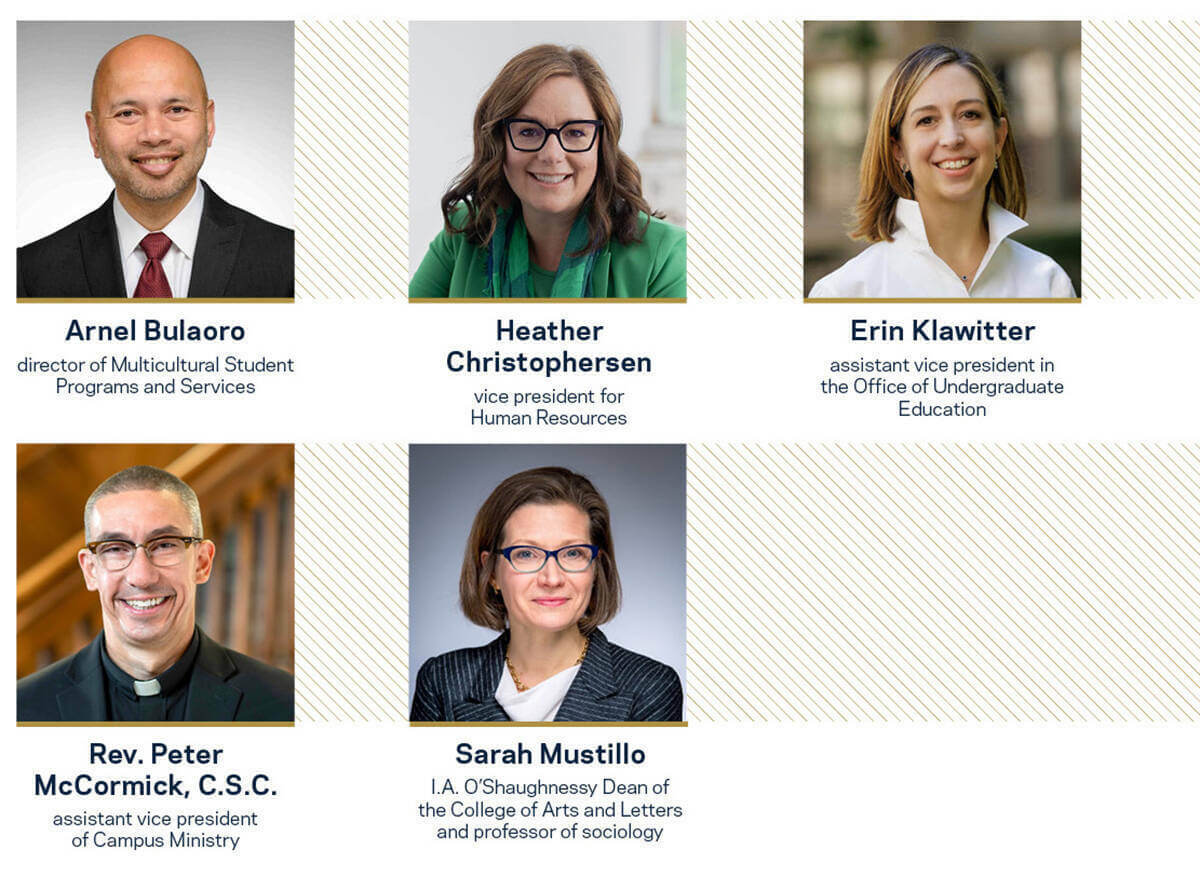
In January, the Office of Institutional Transformation launched the Inclusive Leadership Colloquium Lecture Series (ILCLS) in partnership with Human Resources and the Provost’s Office. This program features insightful and innovative leaders in diverse, equitable, and inclusive practice and provides a forum for sharing ideas, best practices, and inspiration around DEI-related topics of interest.
Our inaugural event, Building the Beloved Community: Perspectives, consisted of a panel of Notre Dame leaders from Campus Ministry, the College of Arts and Letters, Human Resources, Multicultural Student Programs and Services and Undergraduate Education. Improvements in the hiring of diverse faculty and staff and the enrollment of students from diverse backgrounds were cited as signs of positive momentum to making Notre Dame more inclusive. However, it was noted that how the University engages people once they’re here is just as, if not more so, important.
The University’s employee resource groups (ERGs) can help enhance professional development opportunities and foster personal connections for faculty and staff around shared characteristics, noted Heather Christophersen, vice president for Human Resources. Two new ERGs have been added recently—one for employees of Chinese descent and one for those of Indigenous heritage—joining AdelanteND: Latinx Staff and Faculty Association, Black Faculty and Staff Association, NDAbility, Notre Dame Staff of International Descent, Notre Dame Veterans Association, SPECTRUM LGBTQ+ & Ally, THRIVE! Inspiring ND Women and Young Leaders of Notre Dame.
Sarah Mustillo, I.A. O’Shaughnessy Dean of the College of Arts and Letters and professor of sociology, said it’s exciting to see how bringing in additional faculty with diverse backgrounds can broaden the college’s intellectual endeavors through areas of expertise like civil rights and diaspora studies. “[Diversity and inclusion] is enhancing our academic life in the college,” Mustillo said.
On the student side, the recent opening of the Center for Diversity, Equity, and Inclusion was the realization of a long-time priority in Student Affairs, said Arnel Bulaoro, director of Multicultural Student Programs and Services. However, “building the center wasn’t the end result or final goal,” he explained. “The goal is a sense of belonging for all of our students.”
Panelists also cited the benefits of collaboration in multiplying impact and leveraging resources.
Rev. Peter McCormick, C.S.C., assistant vice president of Campus Ministry, referenced partnerships with Multicultural Student Programs and Services and the Transformational Leaders Program as one way of helping underrepresented students feel supported, feel known, and feel that they have opportunities for growth.
“We have all the requisite skills necessary [to build the Beloved Community at Notre Dame], and it’s through collaboration and partnership that affords us the opportunity to take these next steps that sometimes feel aspirational but in reality just require us to take the next faithful step and let God take care of the rest,” McCormick said.
Erin Klawitter, assistant vice president in the Office of Undergraduate Education, echoed the need for more intentionality around cross-campus initiatives. “We have a lot of great initiatives to support students from under-resourced, differently prepared and first-generation backgrounds in different pockets of the University. But we want to do more coordinating efforts and partnerships with the colleges and schools, ND Learning, and Institutional Research, Innovation and Strategy … to look at our student body needs and how we can support them.”
Institutional Transformation will host two additional ILCLS events this spring, bringing in experts from outside of the Notre Dame community to create dialogue around racial justice and anti-racism in education. There are plans to develop the series into an annual event to provide continued opportunities to share information and pinpoint actions that can help Notre Dame cultivate an environment that fully affirms the dignity of every person.
“In some ways, our office is charged with systematizing and operationalizing love,” said Eve Kelly, associate director for strategic initiatives and senior advisor to the vice president for institutional transformation “We can make all of the plans, write all of the reports and hiring strategies that we want, but we won’t be successful unless there’s a personal conversion that happens.” Such a shift, Kelly said, requires self-reflection and honesty.
Key takeaway: “DEI work is heart work and mind work,” Keona Lewis, assistant provost for academic diversity and inclusion, pointed out to attendees in her closing remarks. There is a quantitative element to it, in terms of people, programs, etc., that can be counted or seen. But there’s a qualitative side as well in terms of the change that one can feel. “They’re both different approaches to knowing that, together, create a full understanding of the experience. You should be able to feel and see the outcomes and the impact of a Beloved Community,” said Lewis. What actions can you identify for yourself or your unit that can help students, faculty and/or staff see and feel the work that you’re doing to create a more welcoming Notre Dame?